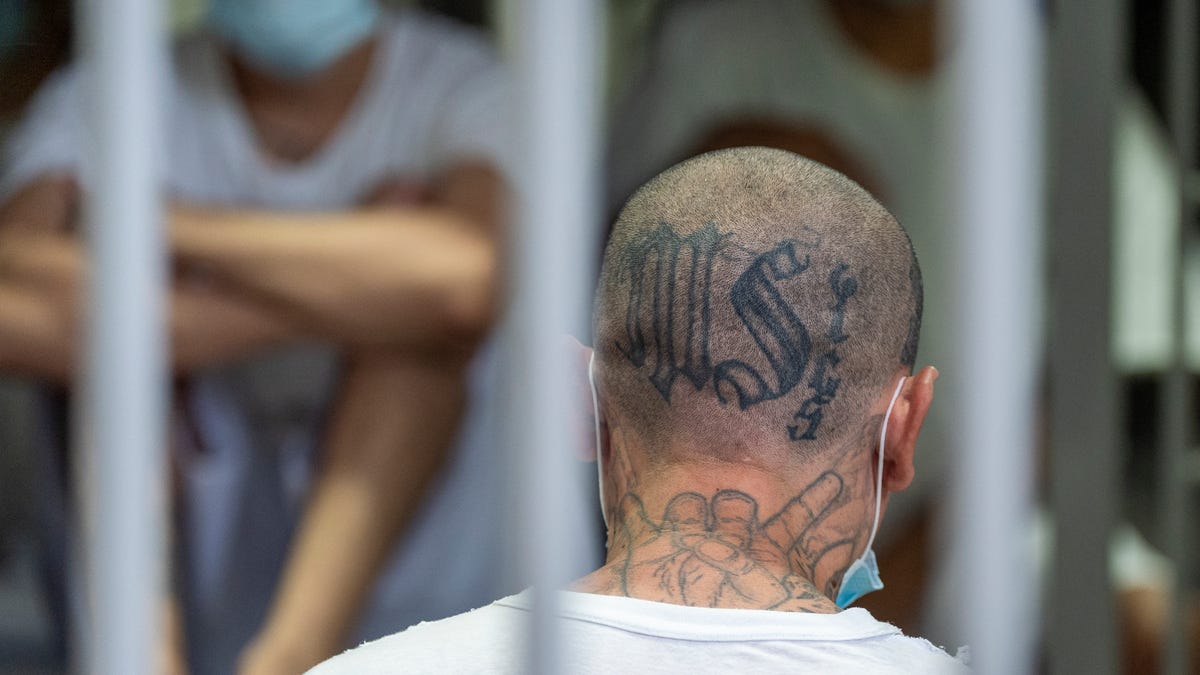Venezuelan alleged gang members deported to El Salvador
The Trump administration has deported 238 Venezuelans to El Salvador via a 1798 law despite a judge’s order.
Federal officials said they captured a top national leader of the Mara Salvatrucha (MS-13) gang in Virginia, a criminal group President Donald Trump designated as a terrorist organization.
The Trump administration, including U.S. Attorney General Pam Bondi, White House Press Secretary Karoline Leavitt and FBI Director Kash Patel, announced the arrest Thursday on social media.
“I’m proud to announce that early this morning our brave law enforcement officers conducted a successful operation that captured a top MS-13 national leader,” Bondi said on X. “DOJ will not rest until we make America safe again.”
During a news conference, Leavitt called the gang leader a “very violent individual” who was picked up in a home where five children were present.
The FBI, with assistance from state and local authorities, took the 24-year-old suspect into custody in Woodbridge, Virginia, Fox News reported. The person was identified as one of the top leaders of the Salvadoran MS-13 gang, authorities confirmed without releasing the suspect’s name.
“This is a massive victory for a safer America,” Patel said on X following the arrest. “Justice is coming.”
Here is what to know about the MS-13 gang.
MS-13 originated in Los Angeles, California
MS-13 originated in Los Angeles, California, and over 10,000 members live in the United States, according to a DOJ fact sheet. The street gang was founded in the 1980s by Salvadoran immigrants, but its presence rapidly grew in Central America, El Salvador, Mexico and even the U.S. following members’ deportations.
Between 50,000 and 70,000 MS-13 members are concentrated in urban areas in Central America or locations outside this region with a large Central American diaspora, a report published in the National Criminal Justice Reference Service (NCJRS) virtual library says. Although the gang is primarily urban, it has spread into more rural areas, such as Long Island and North Carolina, while still increasing in California, according to the 2018 report.
“MS-13 has the features of a social organization more than a criminal organization, in that it is more interested in creating a menacing collective identity than in generating crime-based revenue,” the report reads. “It is a diffuse organization of sub-parts, without a single leader or leadership structure that manages gang life and activities.”
According to the report, “violent behavior” is at the core of MS-13’s actions, and this has led to the gang becoming a target for law enforcement in the U.S. One of the gang’s most pivotal revenue sources is extortion enforced through violence, the report found.
Federal officials designated MS-13 as a transnational criminal organization, which the FBI identifies as a group that operates across national borders and engages in illegal activities for profit, including drug trafficking, migrant smuggling, human trafficking, money laundering, firearms trafficking, illegal gambling, extortion, wildlife smuggling, cybercrime and creating and selling counterfeit goods.
Trump named MS-13 designated terrorists
On Jan. 20, Trump signed an executive order designating eight Latin American cartels as “foreign terrorist organizations,” including Tren de Aragua in Venezuela, MS-13 in El Salvador and others.
MS-13 members have been accused and convicted for high-profile killings, kidnappings and drug trafficking in the Americas, including in Long Island, Washington, D.C. and California. In November 2024, a superseding indictment was unsealed in a Brooklyn federal court for charges stemming from murders allegedly ordered and committed by national leaders, members and associates of MS-13.
“My Office and our law enforcement partners have worked tirelessly to hold MS-13 accountable for the unspeakable harm it has done to its victims and our communities. As these charges make clear, our pursuit of those responsible will not be deterred by the passage of time or by the leaders of MS-13’s futile attempts to hide in the shadows,” U.S. Attorney Breon Peace said in November. “This indictment strikes yet another blow at MS-13’s leadership and demonstrates our work to dismantle MS-13 from top to bottom.”
During Trump’s initial presidency, MS-13 was mentioned often as part of his administration’s crackdown on immigration, particularly from Central America and what he called “sanctuary cities,” which limited law enforcement from working with federal immigration agents.
Trump often called the alleged gang members “animals.” More than a dozen MS-13 members were indicted in 2020 on terrorism charges relating to their alleged involvement in organized crime in the U.S., Mexico and El Salvador over the past two decades.
El Salvador saw record low in homicides amid war on MS-13, other gangs
While the MS-13 members continue to be prosecuted in the U.S., the gang — along with its Los Angeles-originating rival 18th Street — have been at the forefront of Salvadoran President Nayib Bukele’s crackdown on violence in the Central American country. Thousands of individuals have been incarcerated in Salvadoran prisons as the country wages war on gangs, an effort that in 2024 led to a record low of 114 homicides, the Associated Press reported.
Bukele said El Salvador had 1.9 homicides per 100,000 people, which puts the country below what any Latin American country had reported in 2023, according to the AP.
Earlier this month, the U.S. dropped charges against Cesar Lopez-Larios, another MS-13 leader, to deport him to El Salvador as part of a deal with Bukele.
